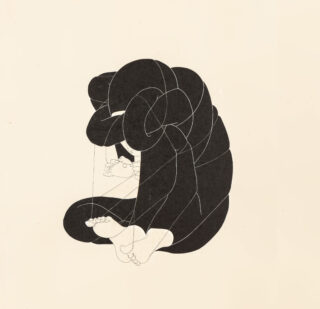Fiction Online
Nothing About Love
By Roskva Koritzinsky
Translated from the Norwegian by Bradley Harmon

The organist played slowly. Sunlight streamed in through the stained-glass window. The dust formed a glittering hand that pointed toward the floor. Churches are built so that one can feel God as an open space within the body. During the celebration that followed, he met her gaze and held it. They looked like siblings.
In the first week they were together every single day. They fucked in a way that the uninitiated believe belongs to the fantasy world of perverts, and that the initiated know is the closest thing to the meaning of life. They ate together and watched movies. They got used to each other and had sex frequently. After orgasm, they grew melancholic, for they believed — both of them — that the peak had now been reached. And then they slept together again, and realized that this was not the case. He lived in a sublet apartment, she in a collective, it was a ten-minute walk between them. Both residences were in deplorable condition, despite their stately location. Her room was larger and brighter than his, but they preferred his place. There they could be in peace.
Lars Bakken constantly had a packet of snus under his lip. He tasted of coffee, tobacco, and sleep. Several days could pass between each time he showered, and he rarely changed his underwear. These habits might have been repulsive, but she didn’t see them that way. Nor was she particularly enthusiastic about them. She was simply unable to feel disgust when something supposedly unappetizing occurred up close. Because of this, she was often perceived as generous and open. The truth was that she had no taste. She lacked the ability to form preferences — she was as rarely repulsed as she was excited — and secretly thought of herself as not entirely human. She’d had many lovers, all with very different lifestyles. She was not looking for the Right Man or the Right Way. Everything was always right, and she would grow restless and end the relationship, but not in anticipation of anything better. Relationships, and their expirations, were just a way to pass the time. This is how she lived. She had to make time, for time was life, go by.
Another reason for her indifferent and/or generous attitude toward people in general, and men in particular, was that it protected her. She became almost nauseous at the thought of being judged based on her own habits; her way of living, her attempts at everyday life and leisure, which included a bedroom that confusingly resembled a drug den, but also a refrigerator with esoteric cheeses and a kitchen where exquisite meals were not infrequently prepared (every morning: the urge to utterly and entirely disappear, to jump out the window or drink oneself to death, followed by the sober reasoning of the afternoon: don’t give up entirely, just a little bit at a time, all the time, so that no one notices). In the bedroom, there were both dirty clothes on floor and expensive dresses in the wardrobe, but she was neither of these things. She would’ve resisted any lover’s attempt to figure out which side represented her true self, and the contemptuous gaze they would then cast at the “non-representative” side. All her qualities were equal parts charming and repulsive. However paradoxical this was, it made her a whole and authentic person. So she refused to give any thought to Lars Bakken’s way of life. She only noticed the snus on the bathroom shelves, the dirty dishes that floated out from the corridor kitchen and into his living room, coffee stains on pillows lacking pillowcases, expensive hair products, several pairs of trousers from the expensive rack, the film collection with Italian films from the sixties and American films from the eighties, his tendency to refrain from drinking water, eating, and sleeping. Did she like his film collection more than the used snus? Impossible to say. Did she like coffee stains better than the expensive clothes? Only the birds know. Occasionally, when his little apartment was overflowing with clutter and filth, she thought of him as a child who had been left home alone for too long, and in that short word, too, the verdict was set. She feverishly tried to push the thought away, but it remained within her.
She and Lars often lay awake at night. As a rule, she was the one talking. The urge to empty out her own life story for every man she met, as if vomiting it out and getting it over with, was perhaps a symptom of a cruel disease, perhaps it was the disease itself. Do people stick together in a desire to reveal each other’s lives? She revealed hers within a month, at most two. She was in a hurry. Not only did she tell little stories about her childhood and adolescence, she also presented intricate and often contradictory self-explanations. Analyses that she had painstakingly put together over the years were handed over in the course of one night to men who were more or less in love — she would decide whether to do this in advance or after sex by gauging whether the analysis would arouse a feeling of care or excitement in the listener. In the midst of it, as she gave her late-night bedtime lectures, often naked and with her head leaning in the palm of her hand — one moment with a dreamy smile, the next with large, helpless eyes — she felt ridiculous. It was as if she had opened the lid of a chest lined with red velvet in an attempt to sell some exclusive loot. The self-explanations did not belong to her. They were frozen in the past, like a reflection of a crying face caught in a mirror while its bearer has already turned away. And as she talked about her childhood and her failed relationships and about the dreams she once had or still does, she stole a glance at her own frozen grin from a dark corner in the room.
One night they lay in Lars Bakken’s bed and watched Charlie Kaufman’s latest film, Anomalisa. The film’s main character has written a book about customer service, and in connection with that he travels out of town to give a motivational speech for employees at a service company. The man is middle-aged, married with a son, but as he arrives at the hotel he encounters two female admirers. They both work as telephone customer service agents and have enthusiastically read his insightful book. He invites one of them, Lisa, to come up to his room. She is quite shy, moderately pretty and moderately intelligent, and he falls in love with just this excessive normality about her. After having sex — a conventional intercourse that to him seems enthralling in all its fumbling and groping — they fall asleep in the hotel bed. That night he has a horrible nightmare. He dreams that he wakes up, goes down to the reception desk, and that everyone in the hotel is in love with him. Gradually their faces and voices merge into one — they become one person. At the end of the nightmare, he storms into the room where Lisa is sleeping, shakes her awake and shouts: “You have to be with me. I’ve realized that everybody is the same person, and you’re the only one who isn’t.”
She looked at Lars Bakken. Was that how he, Lars, experienced her? As The Only Person? They fucked.
Afterward they lay side-by-side on his narrow bed and dozed off. Just before he fell asleep, Lars grabbed her hand. After a while his grip loosened, and she wondered if she should make up for it with her own to prove that she wasn’t someone who could only accept closeness when it was offered to her and not give it herself, or if holding onto the grip that he had already let go of would instead appear as an intrusive or almost desperate act, as if she couldn’t let go. She came to the conclusion that she should squeeze his hand, whether it was an expression of warmth or desperation, for both masked how easy it was for her to let go and run, and she knew that the body was the only thing that could be forced into new patterns. By clinging to Lars Bakken’s hand, she lied with her body and hoped that one day the lie would spread to her brain like a bacterial infection in a hot and humid climate.
Soon Lars Bakken was fast asleep, and soon so was she, with his hand in hers, and in her dream she got up quietly and left the apartment. The corridor was full of unknown men, they turned their faces towards her, there were pointed noses and blunt noses, narrow and wide lips, round and long heads, and eyes, eyes, eyes. She saw them all; she loved them; she knew nothing about love.


